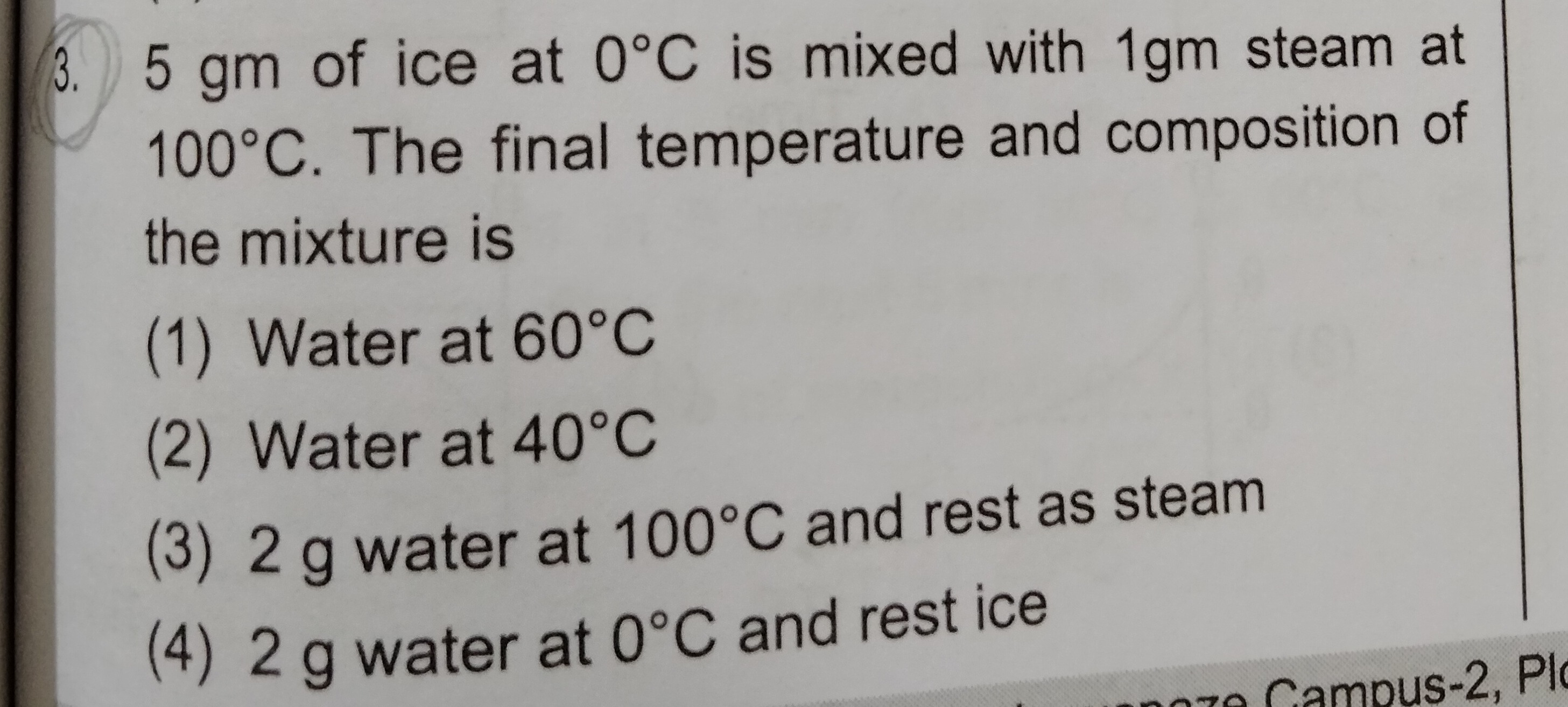Question
Question: 5 gm of ice at 0°C is mixed with 1gm steam at 100°C. The final temperature and composition of the mi...
5 gm of ice at 0°C is mixed with 1gm steam at 100°C. The final temperature and composition of the mixture is

Water at 60°C
Water at 40°C
2 g water at 100°C and rest as steam
2 g water at 0°C and rest ice
Water at 40°C
Solution
Constants:
- Latent heat of fusion of ice (Lf) = 80 cal/gm
- Latent heat of vaporization of water (Lv) = 540 cal/gm
- Specific heat of water (cw) = 1 cal/gm°C
Step 1: Calculate heat required to melt ice. Heat required to melt 5 gm of ice at 0°C into water at 0°C: Qmelt=mice×Lf=5 gm×80 cal/gm=400 cal
Step 2: Calculate heat released by steam to condense. Heat released by 1 gm of steam at 100°C to condense into water at 100°C: Qcondense=msteam×Lv=1 gm×540 cal/gm=540 cal
Step 3: Determine if all ice melts. Since the heat released by condensation (540 cal) is greater than the heat required to melt all the ice (400 cal), all the ice will melt.
Step 4: Calculate the excess heat. After melting the ice, the remaining heat available from the steam is: Qrem=Qcondense−Qmelt=540 cal−400 cal=140 cal At this point, we have 5 gm of water at 0°C and 1 gm of water at 100°C. The 140 cal of remaining heat will be used to raise the temperature of this mixture.
Step 5: Calculate the final equilibrium temperature. Let the final equilibrium temperature be Tf. The total mass of water is 5 gm+1 gm=6 gm. The heat absorbed by the 5 gm of water to reach Tf is Qgain=mw1×cw×(Tf−0∘C)=5×1×Tf=5Tf. The heat released by the 1 gm of water to reach Tf is Qloss=mw2×cw×(100∘C−Tf)=1×1×(100−Tf)=100−Tf.
Using conservation of energy, the heat lost by the hotter water must equal the heat gained by the colder water plus the excess heat. Qloss=Qgain+Qrem 100−Tf=5Tf+140 100−140=5Tf+Tf −40=6Tf Tf=−40/6≈−6.67∘C.
This result is not physically possible. A more robust method is to use the conservation of energy by calculating total heat absorbed and released, assuming a final state of liquid water.
Method 2: Using Qabsorbed=Qreleased
Assume the final temperature Tf is between 0°C and 100°C. The final mixture will be entirely water.
-
Heat absorbed (Qabs) by 5 gm ice to become water at Tf: Qabs=(mice×Lf)+(mice×cw×(Tf−0∘C)) Qabs=(5×80)+(5×1×Tf)=400+5Tf
-
Heat released (Qrel) by 1 gm steam to become water at Tf: Qrel=(msteam×Lv)+(msteam×cw×(100∘C−Tf)) Qrel=(1×540)+(1×1×(100−Tf))=540+100−Tf=640−Tf
-
Equating heat absorbed and released: Qabs=Qrel 400+5Tf=640−Tf 5Tf+Tf=640−400 6Tf=240 Tf=6240=40∘C
Since the calculated temperature Tf=40∘C is between 0°C and 100°C, our assumption that the final state is liquid water at this temperature is correct. The final composition is the sum of the masses: 5 gm (from ice) + 1 gm (from steam) = 6 gm of water.
